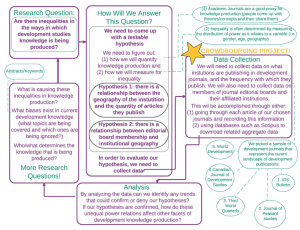Saman Goudarzi
Recent years have seen greater attention being paid to issues surrounding the nature of researcher participation in academic publications. However, this attention often overlooks the spatial geographies of such participation and the ways such patterns can shape academic knowledge production. Even less attention has been paid to such issues in the context of international development, where ideas of equity and cognitive justice are discipline staples. This leg of the project aims to fill this knowledge gap by examining who is contributing to development journals, distinguishing geographic biases in academic publication.
Specifically, this project has two main goals: (1) to determine the patterns of contributions of Northern and Southern researchers in development journals published in the global North and (2), to identify the ways their involvement (or lack thereof) shape knowledge production.
Mapping geographies of development journals is the first step in determining if inequitable patterns exist within academic knowledge production. Inequitable patterns of participation can have serious implications for development theory and practice, as the knowledge disseminated in such journals is often produced with the intention of informing development policy and practice and as such, it has implications for the types of projects that get pursued in the name of development. By demonstrating the disparities in knowledge production in the field of international development, we hope to emphasise on the need for more equitable knowledge production systems.

Methodologies:
The bulk of this project draws from bibliographic data collected from the peer-reviewed literature database, Scopus. A crowdsourcing project was undertaken at UTSC that saw the participation of a number of undergraduate students throughout the 2016-2017 academic year. The project collected institutional affiliation data for a number of top ranking development journals (link to videos). Initial analysis of data for the Journal of Peasant Studies for the 2005-2015 period saw only 22 percent of all affiliate institutions originating from the global South – an indication of geographical bias, with Southern researchers being poorly represented in the journal. Analysis of other top-ranking development journals (Third World Quarterly, World Development, Journal of Development Studies, and Development and Change) is currently underway. Qualitative analysis of article keywords and abstracts is planned.
Although we hope data and information collected for this project will contribute to a number of write-ups, we also aim to provide alternative outputs that are accessible to a wide array of people. While the data we work with certainly is quantifiable, we believe audiences might benefit from learning of these trends as part of various data visualization tools. We have already started to create a number of data visualizations in the form of interactive charts and maps.
Future projects will delve deeper into how and why these observed patterns of publication take shape.